115 scholarly books by Iter Press and 7
start with T
115 scholarly books by Iter Press and 7
115 scholarly books by Iter Press
7 start with T start with T
7 start with T start with T
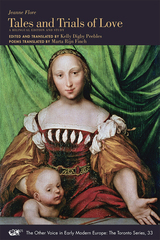
Tales and Trials of Love, Concerning Venus’s Punishment of Those Who Scorn True Love and Denounce Cupid’s Sovereignty
A Bilingual Edition and Study
Jeanne Flore
Iter Press, 2014
Kelly Peebles’s excellent translation and edition of Jeanne Flore’s Comptes amoureux / Tales and Trials of Love (Lyon, 1542) puts Flore back on the map of important French female authors, both for English-speaking readers and for scholars interested more broadly in early modern French print culture. The transcription of the French text, complete with bibliographic details from the first edition, pairs beautifully with Peebles’s dynamic and engaging translation. Peebles’s introduction elegantly shows how Flore’s text stands as a significant textual and material representative of one of the most artistically rich and culturally tumultuous times in early modern France. Her edition and translation will no doubt become a principal reference for future scholarly work not only on Jeanne Flore, but also on female authorship, gender, and print culture in early modern France and Europe.
[more]
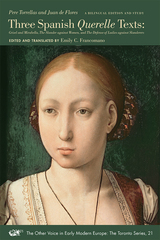
Three Spanish Querelle Texts
Grisel and Mirabella, The Slander against Women, and The Defense of Ladies against Slanderers
Pere Torrellas and Juan de Flores
Iter Press, 2013
This bilingual edition of the Three Spanish Querelle Texts is very well-conceived and will attract a wide audience among specialists and non-specialists alike. Francomano provides the first modern English translations of texts that enjoyed European-wide celebrity in the early sixteenth century. Her introduction is the best available summary of our knowledge about Torrellas’ two texts and Flores’ Grisel y Mirabella. Her translations are more readable than the Spanish texts, dividing Flores’ elaborate, rambling sentences into more comprehensible discourse. She often captures the tone of ambiguous or mock sincerity in the pleadings of both Flores’ and Torrellas’ characters. Francomano has a special sensitivity to the ludic quality of these discourses which helps readers appreciate their expression of “male anxiety” and “female agency” in the gender politics of their era.
[more]
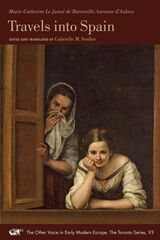
Travels into Spain
Edited by Gabrielle M. Verdier
Iter Press, 2022
A masterpiece of ethnographic observation on seventeenth-century Spain.
While mysteries remain in her biography, Madame d’Aulnoy’s tremendous literary talent is finally being rediscovered. Marie-Catherine Le Jumel de Barneville, baronne d’Aulnoy (1652–1705) was the first Frenchwoman to write, publicize, and publish the account of her travels into Spain as an independent woman. Considered the authority on Spain for nearly two centuries until historiographers labeled them as disreputable, Travels into Spain can now be appreciated for its ironic gaze on realities concealed from male travelers and Madame d’Aulnoy’s unabashedly female and often playful voice. Her writing casts a unique light on gender relations, the condition of women, cultural biases, national rivalries, and religious superstitions at a critical time in early modern cultural and literary history. The first modern translation of Travels into Spain, this book situates Madame d’Aulnoy’s account in its historical context. Travels into Spain is a masterpiece of ethnographic observation, expressing a woman’s view on gender relations, marriage, religion, fashion, food, bullfights, and the Inquisition.
While mysteries remain in her biography, Madame d’Aulnoy’s tremendous literary talent is finally being rediscovered. Marie-Catherine Le Jumel de Barneville, baronne d’Aulnoy (1652–1705) was the first Frenchwoman to write, publicize, and publish the account of her travels into Spain as an independent woman. Considered the authority on Spain for nearly two centuries until historiographers labeled them as disreputable, Travels into Spain can now be appreciated for its ironic gaze on realities concealed from male travelers and Madame d’Aulnoy’s unabashedly female and often playful voice. Her writing casts a unique light on gender relations, the condition of women, cultural biases, national rivalries, and religious superstitions at a critical time in early modern cultural and literary history. The first modern translation of Travels into Spain, this book situates Madame d’Aulnoy’s account in its historical context. Travels into Spain is a masterpiece of ethnographic observation, expressing a woman’s view on gender relations, marriage, religion, fashion, food, bullfights, and the Inquisition.
[more]
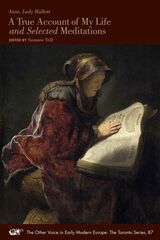
A True Account of My Life and Selected Meditations
Lady Anne Halkett
Iter Press, 2022
The autobiographical narrative of Anne, Lady Halkett.
Born in the early 1620s, Anne, Lady Halkett (née Murray) grew up on the fringes of the English court during a period of increasing political tension. From 1644 to 1699, Halkett recorded her personal and political experiences in both England and Scotland in a series of manuscript meditations and an autobiographical narrative called A True Account of My Life. Royalism, romance, and contemporary religious debates are central to Halkett’s vivid portrayal of her life as a single woman, wife, mother, and widow. Collectively, the materials edited here offer the opportunity to explore how Halkett’s meditational practice informed her life writing in the only version of her writings to date available in a fully modernized edition. The forty-four meditations in this volume redefine the importance of Halkett’s contribution to seventeenth-century life writing.
Born in the early 1620s, Anne, Lady Halkett (née Murray) grew up on the fringes of the English court during a period of increasing political tension. From 1644 to 1699, Halkett recorded her personal and political experiences in both England and Scotland in a series of manuscript meditations and an autobiographical narrative called A True Account of My Life. Royalism, romance, and contemporary religious debates are central to Halkett’s vivid portrayal of her life as a single woman, wife, mother, and widow. Collectively, the materials edited here offer the opportunity to explore how Halkett’s meditational practice informed her life writing in the only version of her writings to date available in a fully modernized edition. The forty-four meditations in this volume redefine the importance of Halkett’s contribution to seventeenth-century life writing.
[more]
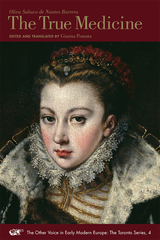
The True Medicine
Oliva Sabuco de Nantes Barrera, Edited by Gianna Pomata, Translated by Gianna Pomata
Iter Press, 2010
This volume offers a new annotated translation, also with a new introduction, of the Dialogue on the True Medicine, one of a series of dialogues published in 1587 as Nueva Filosofia de la Naturaleza del Hombre (New Philosophy of Human Nature), under the name of Oliva Sabuco de Nantes Barrera. Believed for centuries to be a woman’s work, the book was attributed to Oliva’s father, Miguel Sabuco, in the early twentieth century, and its authorship remains a matter of controversy today. Sabuco’s work is one of the most intriguing texts of sixteenth-century medicine. Defined by its author as “a book that was missing in the world,” the work proposes a new ambitious medical theory challenging the humoral view of disease and the main tenets of Galenic physiology.
This annotated translation allows the reader to locate the Dialogue on the True Medicine in the context of early modern medical and philosophical culture, identifying Sabuco’s ancient and modern sources. The editor’s introduction reviews the contested issue of authorship, offers new documentation for the history of the reception of Sabuco’s ideas in the seventeenth century, and relates Sabuco’s work to the Querelle des femmes, the protofeminist debate which had remarkable echoes in early modern medicine.
This annotated translation allows the reader to locate the Dialogue on the True Medicine in the context of early modern medical and philosophical culture, identifying Sabuco’s ancient and modern sources. The editor’s introduction reviews the contested issue of authorship, offers new documentation for the history of the reception of Sabuco’s ideas in the seventeenth century, and relates Sabuco’s work to the Querelle des femmes, the protofeminist debate which had remarkable echoes in early modern medicine.
[more]
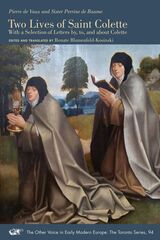
Two Lives of Saint Colette
With a Selection of Letters by, to, and about Colette
Pierre de Vaux and Sister Perrine de Baume
Iter Press, 2022
Two accounts of the life of Saint Colette of Corbie.
Saint Colette of Corbie (1381–1447) was a French reformer of the Franciscan Order and the founder of seventeen convents. Though of humble origin, she attracted the support of powerful patrons and important Church officials. The two biographies translated here were authored by Pierre de Vaux, her confessor and mentor, and Perrine de Baume, a nun who for decades was Colette’s companion and confidant. Both accounts offer fascinating portraits of the saint as a pious ascetic assailed by demons and performing miracles, as well as in her role as skillful administrator and caring mother of her nuns. This is the first English translation of two biographies in Middle French of the most important female figures of the Middle Ages.
Saint Colette of Corbie (1381–1447) was a French reformer of the Franciscan Order and the founder of seventeen convents. Though of humble origin, she attracted the support of powerful patrons and important Church officials. The two biographies translated here were authored by Pierre de Vaux, her confessor and mentor, and Perrine de Baume, a nun who for decades was Colette’s companion and confidant. Both accounts offer fascinating portraits of the saint as a pious ascetic assailed by demons and performing miracles, as well as in her role as skillful administrator and caring mother of her nuns. This is the first English translation of two biographies in Middle French of the most important female figures of the Middle Ages.
[more]
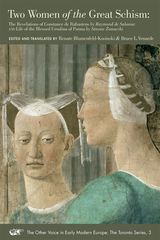
Two Women of the Great Schism
The Revelations of Constance de Rabastens by Raymond de Sabanac and Life of the Blessed Ursulina of Parma by Simone Zanacchi
Raymond de Sabanac and Simone Zanacchi
Iter Press, 2010
The Great Schism (1378–1417) divided Western Christendom into two groups: those who recognized a pope in Rome and those who recognized one in Avignon. It was a crisis of authority that brought with it spiritual anxiety and political uproar. This book presents the responses of two fascinating women whose experiences demonstrate the impact of the Schism on ordinary Christians. Constance de Rabastens (active 1384–1386), who lived in a village in rural Languedoc, had dramatic visions indicting the Avignon pope Clement VII, despite his being recognized in her region. Ursulina of Parma (1375–1408), a diminutive young woman from an urban milieu in Italy, believed that she was commanded by Christ to engage in shuttle diplomacy between the Roman and Avignon papacies in order to end the Schism. Two Women of the Great Schism translates an account of Constance’s visionary experiences as recorded by her confessor Raymond de Sabanac and a posthumous biography of Ursulina by Simone Zanacchi, a pious abbot who wrote some sixty years after his subject’s death. These texts bring to life the extraordinary spiritual and political engagement of two late medieval women who refused to be passive bystanders as rival papal factions tore Christendom apart.
[more]
READERS
Browse our collection.
PUBLISHERS
See BiblioVault's publisher services.
STUDENT SERVICES
Files for college accessibility offices.
UChicago Accessibility Resources
home | accessibility | search | about | contact us
BiblioVault ® 2001 - 2024
The University of Chicago Press









